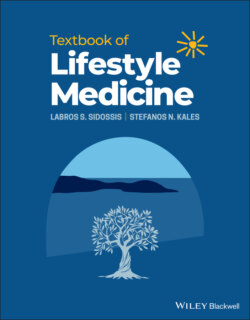Читать книгу Textbook of Lifestyle Medicine - Labros S. Sidossis - Страница 119
Christianity
ОглавлениеFasting is a popular religious practice among many Christians. In many denominations, especially Protestant groups, there are no specific food restrictions or fasting days (although some groups prohibit alcohol or caffeine consumption). Prayer and fasting are often combined as preparation for important decisions or to seek God’s blessing or guidance. However, other Christian denominations have more specific guidelines.
For example, the Greek Orthodox Church advises fasting for 180–200 days throughout the year, i.e., approximately 6.5 months/year. The diet during fasting resembles a vegetarian‐style dietary pattern. Avoidance of meat, fish, milk, eggs, and cheese is recommended on Wednesdays and Fridays. The major fasting periods of the year are 40 days before Christmas, 48 days before Easter, and 15 days prior to the Assumption of Virgin Mary (August 15th). During the fasting before Christmas, devotees do not eat meat, eggs, and dairy, but they can eat fish and olive oil all days except Wednesdays and Fridays. Pre‐Easter fasting has the same dietary restrictions as Christmas, but during this period fish consumption is permitted twice, on March 25th (the Annunciation) and on Palm Sunday. Olive oil consumption is permitted only on weekends.
Orthodox fasting does not impose any restriction on the consumption of mollusks, shellfish, and snails, which are consumed freely during these periods. Animal‐derived products are stored during this period in order to be consumed after the end of fasting. Similar to other religions, the dietary suggestions of the various Christian denominations are associated with low rates of chronic degenerative diseases, and they constitute a sustainable practice with positive financial implications.
Compliance with Orthodox Christianity not only offers a theological structure but also a flexible lifestyle pattern with health benefits. Orthodox fasting periods are characterized by a restriction in total energy and fat intake and an increase in the consumption of carbohydrate and fiber. Lipid profile seems to be optimal, while the reduction in total cholesterol and LDL‐C levels is consistent across studies. However, the effect on HDL is still uncertain. Results regarding the impact on body weight and glucose homeostasis are conflicting, and a definite conclusion cannot be drawn. Further investigation is needed to evaluate the potentially negative effect of orthodox fasting on vitamins D and B12 and mineral (mainly calcium) intake.
